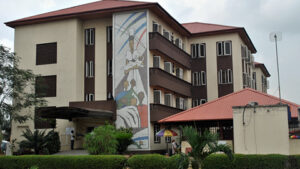Aso Rock vs Washington: Tinubu’s New Independence War

Inside President Tinubu’s Quiet Battle for Nigeria’s Economic Sovereignty in the Age of Trump.
ANALYSIS | Lawrence Oladotun
When Nigeria’s founding fathers — Azikiwe, Awolowo, and Ahmadu Bello — led the nation to independence in 1960, their mission was clear: to reclaim political sovereignty from British rule.
But more than six decades later, President Bola Ahmed Tinubu finds himself fighting a different kind of war — not for flags or borders, but for control over Nigeria’s economic destiny in a world where global power has shifted but old dependencies remain.
In Abuja’s corridors of power, officials describe this as “the second independence struggle.”
And this time, the opponent is not a colonial empire in London — it is the world’s superpower in Washington.
For weeks, the world’s attention has been fixed on a quietly escalating standoff between Nigeria and the United States — one that analysts say could redefine Africa’s role in the global economy.
The flashpoint: Nigeria’s decision to conduct a portion of its oil and gas trade in non-dollar currencies, including the Chinese yuan, Indian rupee, and, in regional transactions, the Nigerian naira itself.
The move, while economically pragmatic, triggered fury in Washington but President Donald Trump with cosmetic smile concealed his reaction to what he perceived as “a betrayal of the dollar.”
.
Then came his post that stunned diplomats on Truth Social where he accused Nigeria government of being complacent to Christian geneocide in the country:
The post reads “If the Nigerian Government continues to allow the killing of Christians, the U.S.A. will immediately stop all aid and assistance to Nigeria, and may very well go into that now disgraced country, “guns-a-blazing,” to completely wipe out the Islamic Terrorists who are committing these horrible atrocities. I am hereby instructing our Department of War to prepare for possible action. If we attack, it will be fast, vicious, and sweet, just like the terrorist thugs attack our CHERISHED Christians!”
Also read Genocide: Trump Threatens Military Action in Nigeria, Alerts US Department of War
In quick succession without engaging Nigeria government, President Donald Trump said the next day that he has asked the Defence Department to prepare for possible military action in Nigeria if the Nigerian government “continues to allow the killing of Christians”.
This comes twenty- four hours after Trump had designated Nigeria as a Country of Particular Concern over alleged Christian genocide.
Inside Aso Rock, aides say there was no panic. Instead, President Tinubu convened his top economic and security advisers, insisting Nigeria would remain calm but firm.
In a measure of direct response days later, he declared:
“Nigeria seeks partnership, not confrontation. But our economic sovereignty is not negotiable.”
Also read Trump’s threat: FG won’t be intimidated, says Tinubu
That statement — sober, deliberate, and unyielding — has become a defining line in modern African diplomacy.
Behind it lies a deeper vision: a deliberate effort to free Nigeria from what many economists now call “post-colonial economic captivity.”
Tinubu’s closest advisers describe his foreign and economic strategy as a continuation of Chief Obafemi Awolowo’s philosophy — that true independence must be economic, not just political.
Awolowo had warned that “no nation is truly free if it cannot determine its own economic destiny.”
Yet for decades, Nigeria has remained tied to external financial systems that dictate the value of its currency, the direction of its trade, and the terms of its growth.
Tinubu’s vision, as articulated in policy circles, is to “complete the sovereignty project” — combining fiscal discipline, energy leverage, and global diversification to secure economic freedom that political independence alone could not guarantee.
This confrontation with Washington did not erupt overnight. It is the culmination of decades of mistrust, disappointment, and broken promises.
Nigeria’s policymakers recall how Western-backed structural adjustment programmes in the 1980s crippled local industries, widened inequality, and deepened poverty.
They remember decades of “development partnerships” that yielded more studies than results, and security cooperation that prioritized American interests over Nigerian realities.
As one senior diplomat put it:
“For years, we were told that democracy and free markets would bring prosperity. What we got instead were lectures, conditions, and dependency.”
So when China, India, and the BRICS nations began offering infrastructure deals, technology transfers, and investment without political preconditions, Abuja listened.
Also read Trump’s Focus on Nigeria: A Move to Support or Suppress?
And when Washington objected, Nigeria asked a question echoing through Africa today:
Why should sovereignty end at the economy?
Nothing reveals the stakes more clearly than Nigeria’s move away from the U.S. dollar in energy transactions.
For decades, the dollar’s dominance in oil markets — the “petrodollar system” — has given the United States immense leverage. Nations dependent on dollar trade remain vulnerable to U.S. sanctions, interest rate shifts, and financial coercion.
Nigeria’s decision to accept multiple currencies — including those of its Asian and African partners — directly challenges that system. It is also part of a wider trend: Saudi Arabia, the UAE, Brazil, and even segments of the European energy market have begun exploring non-dollar settlements.
For Trump, whose political identity is tied to American economic supremacy, Nigeria’s move represents more than policy — it is defiance.
The standoff highlights a deeper shift in world order. The unipolar dominance that followed the Cold War — with the United States as undisputed global arbiter — is fading.
Today, the world is multipolar. China’s economy rivals America’s. India, Brazil, and Indonesia are rising powers. Russia, despite isolation, remains an energy giant. And Africa, led by nations like Nigeria and South Africa, is no longer a silent player.
In this context, Nigeria’s defiance is symbolic. It signals that middle powers — nations too big to be ignored yet too proud to be controlled — are now asserting themselves.
As one European analyst noted:
“Tinubu’s Nigeria is the first African state in decades to look Washington in the eye and say, ‘We decide our future.’ That’s historic.”
Tinubu’s strategy is not reckless. Nigeria is not seeking conflict with the United States. It is seeking balance.
The President has maintained diplomatic engagement with American envoys, even as his administration deepens trade ties with China, renews cooperation with the EU, and coordinates with BRICS nations on financial reforms.
Nigeria’s goal is clear: strategic autonomy — the freedom to engage all partners without subordination to any.
This is not isolationism; it is a pragmatic assertion of sovereignty in a multipolar world.
Under Trump’s current administration, U.S. foreign policy has reverted to muscular nationalism and transactional diplomacy.
The President’s rhetoric — fiery, populist, and often unilateral — reflects a broader anxiety in Washington about losing global influence.
Yet analysts warn that threatening a democratic African power like Nigeria over currency policy would be a catastrophic miscalculation.
“It would mark the end of America’s credibility as a partner in Africa,” said a former U.S. diplomat. “It would confirm every suspicion of economic imperialism.”
Nigeria is not Libya, nor Iraq, nor Venezuela. It is Africa’s largest democracy, the continent’s biggest economy, and home to over 220 million people.
Its natural gas reserves are among the world’s largest. Its market, its youth population, and its location make it indispensable to global supply chains.
If Nigeria succeeds in maintaining its economic independence, it sets a precedent other nations will follow.
If it falters under pressure, it reinforces the old order — where Africa provides resources but not leadership.
There is poetic continuity in this moment.
Where the generation of 1960 won political sovereignty, Tinubu’s government is fighting for economic sovereignty.
Where Awolowo argued for control of national resources, Tinubu seeks control of currency and capital.
Where past leaders accepted foreign prescriptions, this administration is writing its own playbook.
History will judge the outcome — but the intent is unmistakable.
Nigeria is no longer asking for permission to determine its destiny.
As one senior adviser in Aso Rock put it succinctly:
“They took our flag in 1960. Now they want our wallet. Tinubu is saying — no more.”
Whatever the next chapters bring — diplomacy, compromise, or confrontation — one truth has already emerged:
Africa’s most populous nation is no longer content to be a pawn in someone else’s global game.
Tinubu’s Nigeria is demanding what Awolowo once called “the real fruits of independence” — the right to build, trade, and thrive on its own terms.
And whether in Washington or Abuja, Beijing or Brussels, the world is paying attention.
Because in the quiet defiance of Aso Rock, the future of Africa’s sovereignty is being rewritten.






